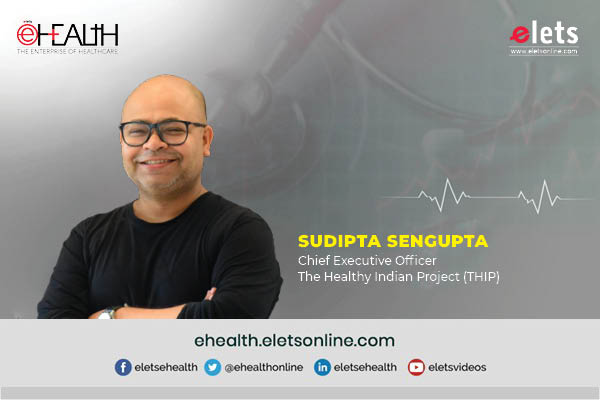
The healthcare sector has been inundated with many red herrings in the recent past, with the pandemic further accelerating this phenomenon. In a recent survey, India emerged as the number one source of COVID-related misinformation. These clouds of misinformation make Sudipta Sengupta, CEO, The Healthy Indian Project (THIP) feel very angry. His platform, THIP Media, has been fighting a lone war of educating gullible citizens on the dangers of health misinformation on the Internet since 2019. “The problem of health misinformation in India is not new. COVID just amplified the situation,” he stated.
He feels that mainstream media platforms are primarily to be blamed for this. And he probably has a point. A simple Google search shows India’s top media websites have published articles claiming to cure Pimples to Cancer without medicine. The problem is especially severe on regional language websites. “Imagine what it does in a country like India where we have multiple medicine systems, multiple languages, and low doctor penetration in rural areas. Any doctor in the country today will tell you how they are constantly witnessing a rise of delayed treatments, self medication, and a constant erosion in doctor-patient relationships. And a major reason for all these is health misinformation.”

THIP Media has been a part of Facebook’s 3rd party fact-checking initiative helping the social media giant to weed out health-based misinformation from the platform. Under the Facebook program, when a fact checker marks a particular content as false or misleading, the platform reduces the content’s reach. He says the irresponsible publishing of health content has seen some improvement due to Facebook’s constant efforts. “Traditional media houses are now careful since it hurts their page views,” he expressed. He also recognises that this is a big responsibility. When your actions can hurt someone else’s business, the margin of error is very, very low. Hence the small team at THIP Media is filled with doctors and science writers. “Every piece of content on THIP Media is based on scientific evidence and written by a team that understands the subject. There is a bigger team of doctors and medical professionals who support us from outside to guide and verify,” he stated. THIP has created a network of medical professionals across the country from various medicinal practices.
THIP has also teamed up with Amrita Centre for Advanced Research in Ayurveda (ACARA) to fact-check misinformation related to Ayurveda. “Indians believe in Ayurveda and rightly so. It’s a part of our culture. But the knowledge base is still very restricted. It’s not something that a common man can easily verify. The situation has been taken advantage of by quacks to attribute unproven, atrocious claims about herbal remedies to Ayurveda,” says Sudipta, whose team works with the researchers of ACARA to segregate the true from the false.
THIP has fact-checked and rated over 1000+ pieces of misinformation on the internet during the pandemic. However, he doesn’t want to label THIP Media as a fact-checking website. He says THIP Media is in the business of health literacy. “As Fact Checkers, we are typically behind the cycle. By the time we fact-check, the misinformation has reached many. In the case of health, this may have severe consequences. The problem of health misinformation cannot be solved until we educate people about basic health concepts. If you manage to educate a person on why diabetes happens and what happens to your body during it, he will be able to see through all those ‘cure diabetes in two days’ type of claims on social media next time he sees them,” he further added.

There are around one billion health-related questions searched on Google every day. A very few of these search results are from credible Indian health websites or cater to Indians in terms of their physiology, language, or medicinal preferences. THIP’s aim is to build a strong repository of basic health information in multiple languages of India. As of now, the platform covers 6 different Indian languages. THIP Media also runs multiple health media literacy training programs in schools, colleges, and old age homes, helping people understand how to fact-check particular health information before they act on it. He feels that the aged population is the most vulnerable regarding health misinformation.
To help the unversed, THIP Media also has a WhatsApp helpline called RAKSHA. Users can send a message to +91-85078-85079 and ask any health questions to RAKSHA. A chatbot built on WhatsApp’s business API helps people fact-check any health misinformation or answer any health question. “People do not go to a doctor to verify a health message they received or to clarify a basic health doubt. They search on the internet or ask unqualified people. That is the feeding point of health misinformation. Hopefully, RAKSHA will be able to make a difference here”, he expressed.
With health issues becoming a common norm, currently, dubious health claims don’t seem to be dying anytime soon. “But, we will be better prepared for the next pandemic,” he concluded. This may not be an overstatement given that multiple experts across various countries have already started putting together a plan for the next pandemic.
Views expressed by Sudipta Sengupta, CEO, The Healthy Indian Project (THIP)
Be a part of Elets Collaborative Initiatives. Join Us for Upcoming Events and explore business opportunities. Like us on Facebook , connect with us on LinkedIn and follow us on Twitter , Instagram.












